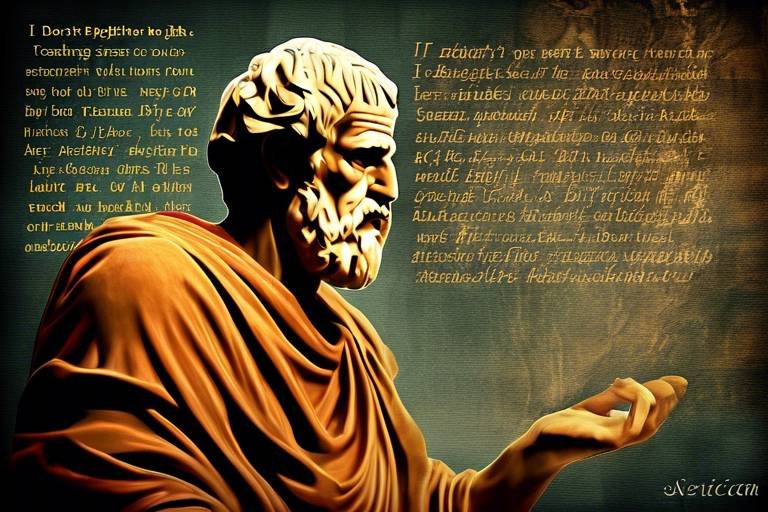Ayn Rand's Philosophical Stance on Altruism versus Egoism
Ayn Rand’s philosophy has sparked intense debates, particularly around the concepts of altruism and egoism. At the heart of her argument is her belief in Objectivism, a philosophy that champions reason, individualism, and the pursuit of one's own happiness. Rand's perspective is not merely theoretical; it challenges the very fabric of how we view morality and ethics in our daily lives. But what does it mean to embrace egoism over altruism? And how does this choice affect our interactions with others and ourselves?
In a world where selflessness is often celebrated, Rand’s advocacy for rational self-interest can seem controversial. She posits that altruism, the selfless concern for the well-being of others, undermines the individual’s right to pursue their own happiness. According to her, altruism demands a sacrifice of self, which she argues is not only impractical but also immoral. Imagine a society where individuals are expected to put others’ needs above their own—this, in Rand's view, leads to a culture of dependency and resentment. Instead, she proposes that true morality lies in recognizing one’s own needs and pursuing them with vigor.
To fully appreciate Rand's stance, we must delve deeper into her definition of altruism and how it contrasts sharply with her concept of egoism. Altruism, as Rand sees it, is a moral code that prioritizes the needs of others over one’s own. This could lead to a situation where individuals feel obligated to sacrifice their own happiness for the sake of others. In contrast, egoism—specifically ethical egoism—advocates for acting in one’s self-interest as a rational and moral choice. Rand believes that by focusing on personal happiness and success, individuals not only enrich their own lives but also contribute positively to society as a whole.
Throughout her works, Rand emphasizes that pursuing one's own interests does not equate to harming others. Rather, she argues that when individuals act in their own best interests, they create a ripple effect that can enhance the well-being of those around them. This is where the beauty of her philosophy shines: it encourages individuals to strive for greatness while simultaneously uplifting those in their community. By embracing egoism, individuals can cultivate a life of purpose and fulfillment, ultimately leading to a more vibrant society.
As we navigate through the complexities of Rand’s views, it’s essential to consider the implications of her philosophy in our daily lives. How can we apply the principles of egoism in a practical sense? For instance, individuals might find themselves making career choices that align with their passions rather than conforming to societal expectations. This could lead to greater job satisfaction, increased productivity, and a more innovative workforce. In essence, Rand’s egoism encourages people to embrace their unique talents and pursue paths that resonate with their true selves.
However, Rand’s critiques of altruism are equally compelling. She argues that self-sacrifice can lead to a dangerous precedent where individuals feel compelled to prioritize others’ needs at the expense of their own well-being. This can create a cycle of guilt and obligation that stifles personal growth and happiness. By prioritizing altruism, society risks fostering a culture where individuals are not held accountable for their own happiness, leading to widespread discontent and frustration.
In conclusion, Rand’s philosophical stance on altruism versus egoism is not just an academic debate; it’s a call to action for individuals to reevaluate their moral compass. By embracing egoism, we can cultivate a society that values personal responsibility and genuine happiness. So, as we reflect on these concepts, ask yourself: Are you living for yourself, or are you sacrificing your happiness for others?
- What is Objectivism? Objectivism is a philosophy developed by Ayn Rand that emphasizes reason, individualism, and the pursuit of one's own happiness as the highest moral purpose.
- How does Rand define altruism? Rand defines altruism as a moral code that demands self-sacrifice for the sake of others, which she critiques as detrimental to individual freedom and happiness.
- What is ethical egoism? Ethical egoism is the belief that acting in one's self-interest is not just rational but also a moral obligation.
- Why does Rand believe egoism is morally superior? Rand argues that pursuing one's own interests leads to a more fulfilling life, benefiting both the individual and society.

The Foundations of Objectivism
Understanding Ayn Rand's philosophy of Objectivism is crucial for grasping her stance on altruism and egoism. At its core, Objectivism is built on the premise that reality exists independently of consciousness, and that individuals must use reason as their primary means of understanding the world. This philosophy champions the idea that the pursuit of one's own happiness is not just a personal goal but a moral imperative. In Rand's view, every individual has the right to live for themselves, and this self-interest is the foundation upon which a flourishing society can be built.
One of the most compelling aspects of Objectivism is its emphasis on individualism. Rand argues that each person is an end in themselves, not a means to the ends of others. This perspective fosters a profound respect for personal autonomy and the idea that individuals should be free to pursue their own goals without interference. The belief in individual rights is not merely a political stance for Rand; it is a deeply held moral principle that asserts the importance of personal responsibility and the necessity of rational thought in guiding one’s actions.
Moreover, Objectivism posits that happiness is the ultimate purpose of life. Rand famously declared, “The man who produces while others dispose of his product is a slave.” This statement encapsulates her belief that productive work is not just a means to an end, but an expression of one’s values and a source of personal fulfillment. By engaging in productive endeavors, individuals not only achieve their own happiness but also contribute to the well-being of society as a whole.
To summarize, the foundational principles of Objectivism can be encapsulated in the following key tenets:
- Reality: The belief that the external world exists independently of our perceptions.
- Reason: The recognition that rational thought is the only means of acquiring knowledge.
- Individualism: The idea that each person is an end in themselves, deserving of their own pursuit of happiness.
- Self-Interest: The assertion that acting in one’s own rational self-interest is moral.
- Productivity: The belief that productive work is a virtue and a means to achieve happiness.
In essence, Objectivism serves as a philosophical framework that champions the individual's right to live for themselves, advocating for a society where personal freedom and rational self-interest are celebrated. This foundation is pivotal in understanding Rand's critique of altruism, as it sets the stage for her arguments against self-sacrifice and the moral implications of prioritizing others' needs over one's own. By establishing a clear distinction between altruism and egoism, Rand's philosophy invites us to reconsider our values and the ethical systems that govern our lives.

When we talk about altruism, it's essential to understand how Ayn Rand perceives it, particularly through the lens of her philosophy, Objectivism. Altruism, in its most basic sense, is the selfless concern for the well-being of others. It’s a concept that has been revered in many cultures and moral teachings, often touted as the highest virtue. However, Rand flips the script on this notion, arguing that altruism, as commonly understood, can undermine individual freedom and personal responsibility.
To Rand, altruism is not merely about helping others; it's about a moral duty to prioritize others' needs above one's own. This perspective, she argues, leads to a form of self-sacrifice that can be detrimental to both the individual and society at large. By promoting selflessness as a moral ideal, altruism can encourage individuals to neglect their own desires and aspirations. Rand believes that this can create a society where people feel guilty for pursuing their own happiness, which she sees as fundamentally flawed.
In her critique, Rand outlines several implications of altruism that challenge its perceived virtue:
- Loss of Individuality: Altruism often demands that individuals sacrifice their own interests for the sake of others, leading to a homogenization of values and desires.
- Dependency Culture: By prioritizing the needs of others, altruism can foster a sense of dependency rather than empowerment, where individuals rely on the selflessness of others instead of taking responsibility for their own lives.
- Moral Guilt: Altruism can instill a sense of guilt in individuals who pursue their own happiness, making them feel selfish for not prioritizing others.
Rand argues that such implications create a moral framework that is not only impractical but also detrimental to the human spirit. She believes that true morality should enhance one's life and happiness, not diminish it. In her view, the ideal moral code should encourage individuals to pursue their own interests and happiness, thereby fostering a society where people can thrive both individually and collectively.
In summary, Rand's definition of altruism is starkly different from the conventional understanding. By critiquing selflessness as a moral ideal, she lays the groundwork for her argument in favor of egoism, which prioritizes rational self-interest and individual happiness. Understanding her perspective on altruism is crucial for anyone looking to grasp the full scope of her philosophical stance on egoism.

Egoism Explained
Ayn Rand's concept of egoism is a cornerstone of her philosophical framework known as Objectivism. At its core, egoism is about recognizing that acting in one's own self-interest is not just rational, but also a moral imperative. This perspective challenges the conventional wisdom that often equates selflessness with virtue. Instead, Rand argues that self-interest is the driving force behind human progress and happiness. Imagine a world where everyone is encouraged to pursue their own goals and passions—this is the essence of egoism.
Rand specifically champions ethical egoism, which posits that individuals should act in ways that promote their own well-being. Unlike the altruistic model that encourages self-sacrifice for others, ethical egoism asserts that one's own happiness is paramount. This does not mean that one disregards others; rather, it emphasizes that true fulfillment comes from pursuing one's own values and interests. In her view, when individuals prioritize their own happiness, they contribute to a more prosperous society. It's like the idea of a rising tide lifting all boats—when individuals thrive, the community benefits as a whole.
To further clarify, let's break down some key aspects of Rand's egoism:
- Self-Interest as a Guiding Principle: Rand believes that individuals should make choices that align with their own values and goals.
- Rationality: Egoism requires rational thinking; it is not about whim or impulse but about making informed decisions that lead to long-term happiness.
- Voluntary Exchange: Rand advocates for interactions based on mutual benefit, where individuals engage in relationships and transactions that serve their interests.
This philosophy is not just theoretical; it has practical implications in everyday life. For instance, consider a person who chooses a career based on passion and personal fulfillment rather than societal expectations. By doing so, they not only find joy in their work but also become more productive and creative, ultimately benefiting those around them. This is how Rand's egoism manifests in real-world scenarios—by encouraging individuals to pursue what truly matters to them, she believes they can achieve their best selves.
Critics often misinterpret egoism as a call for selfishness or disregard for others, but this couldn't be further from the truth. Rand's idea of egoism is rooted in the belief that individuals can achieve their goals without harming others. In fact, she argues that when people act in their own best interests, they are more likely to respect the rights and needs of others, creating a harmonious society where everyone can thrive.
In summary, Rand's egoism is a celebration of the individual and the pursuit of happiness. It encourages a shift in perspective from self-sacrifice to self-fulfillment, urging people to recognize that their own desires and ambitions are not just valid but essential for a thriving society.

Ayn Rand's philosophy boldly asserts that egoism is not just a rational choice, but a moral imperative. At first glance, the idea of prioritizing one's own interests might seem self-centered or even selfish, but Rand flips this notion on its head. She argues that when individuals act in their own self-interest, they are not only fulfilling their own potential but also contributing to the greater good of society. This is where the beauty of her philosophy lies—it's a win-win situation.
To understand Rand's moral justification for egoism, we must first recognize that she sees self-interest as a natural and essential part of human existence. She posits that every individual has the right to pursue their own happiness, which is not merely a lofty goal but a fundamental human right. In her view, when people act in accordance with their own rational self-interest, they cultivate their talents, passions, and abilities. This not only leads to personal fulfillment but also enhances the overall productivity and creativity of society.
One of the key arguments Rand makes in favor of egoism is that self-sacrifice, often celebrated in altruistic ideologies, can lead to a detrimental cycle of dependency and resentment. When individuals prioritize the needs of others at their own expense, they risk becoming martyrs, which can stifle their personal growth and happiness. In contrast, when people focus on their own goals and aspirations, they are more likely to engage positively with others, fostering mutual respect and cooperation.
Consider this analogy: think of a garden. If every plant were to grow only for the benefit of others, neglecting its own needs for sunlight and water, the garden would soon wither. However, when each plant seeks to thrive individually, the garden flourishes as a whole. This reflects Rand's view that a society made up of individuals pursuing their own interests can create a vibrant and dynamic community.
Rand also contends that ethical egoism is not just about pursuing one’s own happiness; it’s about doing so in a way that respects the rights of others. This means that while you chase your dreams, you must do so without infringing on the rights of others to do the same. This principle forms the bedrock of a just society where individuals can coexist and cooperate without sacrificing their own values.
In essence, Rand's moral justification for egoism can be summarized in a few key points:
- Self-Interest is Natural: Pursuing one's own happiness is a fundamental aspect of being human.
- Mutual Benefit: When individuals thrive, society benefits as a whole.
- Respect for Rights: Ethical egoism requires respecting others' rights to pursue their own interests.
Ultimately, Rand's perspective on egoism invites us to rethink conventional notions of morality. Instead of viewing self-interest as a vice, she encourages us to embrace it as a virtue. By doing so, we not only enhance our own lives but also contribute to a more prosperous and harmonious society. This radical shift in thinking challenges us to consider how we can align our personal goals with the broader needs of our communities, creating a landscape where individuality and collective well-being go hand in hand.

When we think about egoism in practice, it’s essential to realize that it’s not about being selfish in a negative way; rather, it’s about understanding and embracing your own needs and desires as valid and worthy of pursuit. Imagine you're on a plane, and the flight attendant instructs you to put on your oxygen mask before helping others. Why? Because if you don't take care of yourself first, you won’t be able to help anyone else. This analogy perfectly captures Rand's perspective on egoism—it's about ensuring your survival and well-being, which ultimately enables you to contribute positively to the world around you.
In everyday life, practicing egoism can manifest in various ways. For instance, consider your career. Choosing a job that aligns with your passions and interests is a form of egoism. It’s not just about the paycheck; it’s about finding fulfillment and happiness in what you do. When you are genuinely satisfied with your work, you are more productive and creative, which can lead to greater contributions to your field and society at large.
Moreover, egoism encourages individuals to set boundaries. This means saying no to obligations that drain you or do not align with your values. It's about prioritizing your time and energy for activities that enrich your life. For example, if volunteering every weekend leaves you feeling exhausted and resentful, it might be time to reassess your commitments. By focusing on what truly matters to you, you not only enhance your own life but also create space for genuine interactions and contributions to others.
Another practical application of egoism can be seen in personal relationships. Healthy relationships thrive on mutual respect and understanding. When both partners prioritize their own happiness and well-being, they create a more balanced and fulfilling connection. This doesn’t mean neglecting your partner's needs; rather, it’s about recognizing that your happiness is just as important as theirs. When both individuals practice egoism, they foster an environment where both can thrive.
To illustrate this further, let's take a look at a simple table that outlines the differences between altruistic actions and egoistic actions in various scenarios:
| Scenario | Altruistic Action | Egoistic Action |
|---|---|---|
| Career Choice | Choosing a job for the salary alone | Choosing a job that aligns with personal passions |
| Personal Relationships | Constantly putting a partner's needs first | Ensuring both partners' needs are met |
| Community Service | Volunteering out of obligation | Volunteering for causes that resonate personally |
In essence, egoism is about taking ownership of your life choices and recognizing that your happiness is not just a personal goal but a foundation for a thriving society. When individuals prioritize their own well-being, they are more likely to contribute positively to their communities, creating a ripple effect of fulfillment and productivity. So, the next time you find yourself grappling with a decision, ask yourself: “Does this serve my best interests?” If the answer is yes, embrace that choice with confidence.

Ayn Rand's critiques of altruism are as profound as they are provocative. She challenges the very foundation of altruistic thought, arguing that it often leads to a **detriment** of individual freedom and personal responsibility. In Rand's view, altruism promotes a culture of self-sacrifice, where individuals are encouraged to place the needs of others above their own. This, she asserts, is not only irrational but also morally questionable. By prioritizing others' needs, individuals risk neglecting their own happiness and well-being, which she believes is essential for a thriving society.
One of the main points Rand makes is that altruism, as commonly understood, demands selflessness and often glorifies suffering for the sake of others. She argues that this can lead to a **parasitic** relationship where individuals feel obligated to give at the expense of their own values and desires. For Rand, this is a **dangerous** philosophy that can stifle creativity, innovation, and personal growth. When people are taught that their primary moral duty is to serve others, they may become resentful and unfulfilled, leading to a society that is not only less happy but also less productive.
Moreover, Rand posits that altruism can create a **moral hierarchy** that places the needs of the few above the rights of the many. This can result in a societal structure where the most productive and innovative individuals are penalized for their success, while those who contribute less are celebrated for their sacrifices. In her eyes, this undermines the very essence of individual rights and freedoms, creating a culture where mediocrity is rewarded and excellence is vilified.
In her critique, Rand also highlights the **psychological** implications of altruism. She argues that individuals who adopt an altruistic mindset may develop feelings of guilt and inadequacy when they pursue their own interests. This internal conflict can lead to a fractured sense of self, where individuals feel they must choose between their own happiness and the perceived moral obligation to help others. Such a dichotomy is not only unhealthy but also counterproductive, as it can lead to burnout and resentment.
Ultimately, Rand's critique of altruism is a call to recognize the value of **self-interest** as a moral imperative. By embracing rational egoism, she believes individuals can achieve a more fulfilling and productive life. This philosophy encourages people to pursue their own happiness, which, in turn, can create a society where everyone thrives. In this sense, Rand's arguments against altruism are not merely philosophical musings; they are a **rallying cry** for individuals to reclaim their right to live for themselves.
- What is Ayn Rand's main argument against altruism?
Rand argues that altruism undermines individual freedom and personal responsibility, promoting self-sacrifice at the expense of one's own happiness. - How does Rand define egoism?
Rand defines egoism, particularly ethical egoism, as the principle that acting in one's self-interest is both rational and moral. - What are the psychological effects of altruism according to Rand?
Rand suggests that altruism can lead to feelings of guilt and inadequacy in individuals, creating a conflict between personal happiness and moral obligation. - Can altruism coexist with individual rights?
Rand believes that altruism fundamentally conflicts with the concept of individual rights, as it often prioritizes the needs of others over the rights of the individual.

When we dive into the philosophical waters of egoism and altruism, it’s like stepping onto a battleground where two ideologies clash for the hearts and minds of society. Ayn Rand's perspective on these concepts isn't just an abstract debate; it’s a lens through which we can examine the very fabric of our social interactions and ethical frameworks. In a world where self-interest often meets the demands of collective responsibility, understanding Rand's views can illuminate the complexities of our moral choices.
At the core of Rand's philosophy lies the belief that individuals should prioritize their own happiness and well-being. This idea challenges the conventional notion that self-sacrifice is the pinnacle of moral behavior. In Rand's view, egoism doesn't just serve the individual; it can enhance societal progress. When people pursue their own interests, they innovate, create, and contribute to the world in ways that altruistic self-denial often stifles. Imagine a society where everyone is encouraged to chase their passions—wouldn't that lead to a more vibrant and dynamic community?
On the flip side, altruism can sometimes create a paradox. While the notion of selflessness appears noble, Rand argues that it can lead to a culture of dependency and resentment. If individuals are taught to prioritize others' needs over their own, they may neglect their own potential and happiness. This can result in a society where people feel obligated to sacrifice their own interests, leading to a cycle of unfulfilled lives. In essence, altruism, as Rand critiques, can be a double-edged sword—one that cuts not only the self but also the fabric of society.
To illustrate this further, consider the following table that contrasts the implications of egoism and altruism in societal contexts:
| Aspect | Egoism | Altruism |
|---|---|---|
| Individual Motivation | Self-interest drives innovation and personal fulfillment. | Selflessness may lead to personal neglect. |
| Social Dynamics | Encourages healthy competition and collaboration. | Can foster dependency and resentment. |
| Ethical Implications | Morally justifiable to pursue one’s own happiness. | May lead to moral dilemmas regarding self-sacrifice. |
As we dissect these two philosophies, it's crucial to recognize how they manifest in our daily lives. For instance, in the workplace, an egoistic approach might inspire individuals to take initiative, pursue promotions, and innovate, ultimately benefiting the company and society at large. Conversely, an altruistic mindset might lead to employees prioritizing team harmony over personal ambition, which could stifle creativity and progress.
Ultimately, the debate between egoism and altruism in society isn't merely about choosing one over the other; it's about finding a balance. Rand advocates for a philosophy where individuals can pursue their own happiness while still recognizing the importance of social cooperation. This balance is essential for a thriving society, where personal achievement and collective well-being can coexist harmoniously.
In conclusion, Rand's arguments present a compelling case for reevaluating our societal norms. By embracing a philosophy that champions rational self-interest, we might just unlock the potential for a more prosperous and fulfilling society, where individuals are empowered to pursue their dreams without the guilt of neglecting others. After all, when we elevate the individual, we elevate society as a whole.
- What is the main difference between egoism and altruism? Egoism emphasizes self-interest as a moral imperative, while altruism prioritizes the needs of others, often at the expense of the self.
- How does Ayn Rand define altruism? Rand critiques altruism as a moral ideal that demands self-sacrifice, which she believes undermines individual freedom and responsibility.
- Can egoism lead to a better society? According to Rand, when individuals act in their self-interest, it can lead to innovation and societal progress, benefiting everyone.
- Is altruism entirely negative? While Rand critiques altruism, she acknowledges that helping others can be beneficial, but it should not come at the cost of one’s own happiness and potential.

Ayn Rand's philosophy, particularly her contrasting views on altruism and egoism, continues to resonate in today's complex social landscape. In an era where self-sacrifice is often celebrated as a virtue, Rand's call for rational self-interest challenges us to reconsider our moral frameworks. Her ideas encourage individuals to prioritize their own happiness and well-being, asserting that this pursuit is not only acceptable but essential for a fulfilling life. This perspective is particularly relevant as we navigate the pressures of modern society, where the demands of altruism can sometimes lead to personal burnout and resentment.
Moreover, Rand's emphasis on individualism and personal responsibility serves as a powerful reminder that each person is the ultimate authority over their own life. In a world that often pushes collective ideologies, her philosophy advocates for the freedom to think independently and make choices that align with one's own values. This independence is crucial, especially in discussions around ethics, where the balance between helping others and taking care of oneself can become blurred.
As we reflect on the implications of Rand's philosophy, it's essential to recognize its influence on contemporary debates surrounding morality and individual rights. In various fields—from politics to economics—her ideas prompt us to question the status quo and explore the potential benefits of a society that values egoism over altruism. The notion that pursuing one's self-interest can lead to a more prosperous and harmonious society is a compelling argument that merits further exploration.
In conclusion, Rand's philosophical stance offers a refreshing perspective in today's discussions about ethics and morality. Her advocacy for egoism challenges us to embrace our own needs and desires while understanding their importance in the broader context of human interaction. As we continue to grapple with these ideas, Rand's work remains a significant touchstone, inviting us to engage with the fundamental questions of how we relate to ourselves and to one another.
- What is Ayn Rand's Objectivism?
Objectivism is a philosophical system developed by Ayn Rand that emphasizes reason, individualism, and the pursuit of one's own happiness as the moral purpose of life.
- How does Rand define altruism?
Rand defines altruism as a moral doctrine that places others' needs above one's own, which she critiques as detrimental to individual freedom and responsibility.
- What is ethical egoism according to Rand?
Ethical egoism, in Rand's view, is the idea that acting in one's self-interest is not only rational but also morally right, leading to a more fulfilling life.
- Why is Rand's philosophy still relevant today?
Rand's philosophy challenges contemporary views on morality, encouraging individuals to prioritize their own well-being, which is increasingly important in today's demanding society.
Frequently Asked Questions
- What is Ayn Rand's definition of altruism?
Ayn Rand defines altruism as the moral code that places others' needs above one's own. She believes this selflessness undermines individual freedom and personal responsibility, promoting a sacrifice of self for the sake of others, which she critiques as a flawed moral ideal.
- How does Rand's philosophy of Objectivism relate to egoism?
Rand's Objectivism emphasizes rational self-interest and individualism. In her view, ethical egoism, which advocates acting in one's self-interest, is not just rational but also moral. She argues that pursuing one's own happiness leads to a more fulfilling life, benefiting society as a whole.
- What are the core principles of Objectivism?
The core principles of Objectivism include the belief in reason, individual rights, and the pursuit of one's own happiness. Rand posits that these elements are essential for a flourishing life and that they stand in stark contrast to the self-sacrificial nature of altruism.
- Can you explain the moral justification of egoism according to Rand?
Rand argues that egoism is morally superior because it encourages individuals to seek their own happiness and well-being. She believes that when people act in their self-interest, they not only enhance their own lives but also contribute positively to society by creating value and fostering innovation.
- How can Rand's ideas on egoism be applied in everyday life?
In everyday life, Rand's principles of egoism can manifest through making choices that prioritize personal goals and happiness. This might involve pursuing a career that aligns with one's passions, setting boundaries in relationships, or investing time in self-care, all while recognizing that such actions can lead to mutual benefit.
- What are some critiques of altruism that Rand presents?
Rand critiques altruism by arguing that it often leads to self-sacrifice and the neglect of one's own needs. She warns that prioritizing others' needs can create a culture of dependency and resentment, ultimately harming both the individual and society.
- How do Rand's views on altruism and egoism influence societal dynamics?
Rand's views suggest that a society that embraces egoism promotes individual rights and innovation, while one that prioritizes altruism may foster mediocrity and dependency. Her philosophy encourages a reevaluation of moral values in social structures, advocating for a balance that respects individual pursuits.
- Is Rand's philosophy still relevant today?
Yes, Rand's philosophy remains relevant as it sparks discussions about morality, ethics, and individual rights in contemporary society. Her ideas challenge traditional notions of selflessness and invite individuals to consider the importance of self-interest in achieving personal and societal progress.



















